- Home
- Tim Winton
Minimum of Two Page 2
Minimum of Two Read online
Page 2
At the school ball the boy gets so drunk his friend makes him go outside and sleep in the car. He wakes to the sound of rocking on the front seat. At the girl’s final squeal, his jeans fill with a terrible heat. He swears things are the same.
The boy’s friend keeps the car at his own place, even though they both drive now. The boy doesn’t mind. His friend still picks him up and he rides in the back and drinks beer and passes out and wakes to a little squeal.
Signs go up all over the beachfront. Redevelopment. High-rise project. Luxury hotel. Observation tower. The boy doesn’t believe it will happen. The beach has always been the same. Even for his mother.
Through his bedroom window in the early morning, he is woken by the sound of bulldozers. Someone will stop it; he knows they will.
VI
The boy finishes his final year exams. The year has almost ended. A year no longer feels like a year. Summers seem patchy and short. After the graduation party he rides with his friend and the girl down to the beach where they drink beer from the jagged end of a bottle they open on the door. The burger joints and pinball parlours are gone. Security fences and puce floodlights surround the cranes and the ugly bones of the hotel tower. The boy feels a hole open in him. He strains beer through his teeth.
His friend and the girl flex on the front seat but he can’t absent himself. There’s a faint, wet breeze, but nothing moves outside. Twisted cartons and stuck-flat wrappers park on the asphalt. The cyclone wire fences glint salty with moisture. Down on the sand, gulls make lumps of themselves in sleep.
In a week he will no longer be a schoolboy. Every morning he wakes with a hard ball of panic in his stomach.
The wet, butcher-shop sound of lips and tongues. The girl sighs. From the back seat, the boy begins a story about how he once caught so many prawns in the river with his father that they had to take off their clothes and tie knots in the arms and legs and use them as bags to carry prawns that overflowed the tubs. The girl springs up off the seat in front, breasts afloat, and turns the radio on full-belt. For a while the boy stays stuck fast in a corner of the back seat. The song makes the whole car vibrate. He feels his eyes itching. He holds his breath.
The beach is a place where a man can feel
he’s the only soul in the world that’s for real . . .
It’s an old record. A mob of things rush him. He remembers. He remembers.
And I see a face coming through the haze
I remember him from those crazy days . . .
People should be born old and die young, he thinks. Grow back; grow back. Memories everywhere.
His friend starts the car. The boy jerks. Next year no one will know them.
They buy more beer. Under the lights of the drive-in bottle shop, the boy remembers the shack up the coast. He remembers sunburn so bad his mother bathed him with vinegar. No beginnings then, and no endings.
From the back seat he tells them about the beach shack. The girl says it’s too far and why didn’t he remember it before. He shrugs. Thought you were a professional rememberer, she says. They drive up the highway with her laughing. The boy sits in the back trying to catch his friend’s eye in the rear-view mirror. He gulps down a can of beer. He sits back with all the windows open and feels the wind take him. Remembers the haze coming down on the beach.
Outside the city, the hot, moist night smells of grass. Backyards, summer. The girl’s perfume streaks back to him, triggering. His mother? No, a squeal outside the gym and a flush of heat.
Down a narrow limestone road they wind. Here the dunes are bald and creeping. Sound of heavy surf. The air smells of peppery coastal plants. Black shapes emerge as houses. The boy points out an asbestos place. He opens his third can and pours it scalding-cold down his throat.
With the motor off there is only the sound of the sea. There is no key. The boy gets the jack out of the car and puts it through a window. He doesn’t feel drunk. He is starting to feel dead. The girl calls him an idiot. His friend sheepishly turns the power on. Inside, everything is carpeted with dust. Walking on the linoleum they leave footprints. Around the walls stand big iron beds, and on shelves, fat paperbacks. A wicker craypot. In the sink drain, the skeleton of a mouse. Out of his deadness, the boy feels panic coming.
They sit on beds. The girl sighs. His friend looks away. The boy looks at his friend’s girl. She is slim and brown and her breasts stand up under her singlet top. She has dark, small lips and deep eyes. He asks: Aren’t you afraid of getting old? She asks: Is there any beer left? His friend goes out to the car. She sniffs and follows. The boy watches their footprints.
Nothing.
His friend comes back. No beer left. Is he all right? Doesn’t he want to go home?
But the boy springs up and begins to hunt for beer. His father kept loads of it. The boy tears cupboards open and guts them, tossing aside bloated tins of pork and ricecream while his friend stands by.
The girl comes inside and asks where is the toilet. The boy points the way and keeps rooting in the cupboards. When she returns, she holds out an old can. A rusty, unopened beer can. The boy takes it. Must be a thousand years old, his friend says. It has no rip-top. It is the kind people used to open with a knife-like opener.
The boy drags a drawer out and finds the old, black opener. It looks like a scythe. You can’t drink it, his friend says. But the boy knows he can. There are no memories coming, of course he can.
He slams the flaky old can onto the Laminex table. Braces it against his thigh. Brings the point of the blade to rest on the corroded top. Hard to get a purchase. He leans down hard on the blade. The can slips aside. He feels the cold shock of steel in his groin. He takes in a jet of air. The can rolls across the table and thumps on the floor, keeps rolling.
What? His friend looks at him.
What? the girl says.
The boy looks at the blood on his hand. His friend grabs him and for a moment they hold hands like that, gore slipping between their fingers.
His friend looks down. Oh, shit! Oh!
Laugh, the boy thinks, losing his grip; laugh!
VII
Wind tears at him, tearing him down. The motor beats like a heart in his ears. There is heat in his jeans. A warm, warm bath. A year starts to feel like a year again, but no memory comes.
Gravity
JERRA NILSAM SAT with his son at a café table and the breeze was in his shirt. The day was all but gone from him now, and there was a party to attend. To host, in fact. It was a friend’s birthday. He was late but he was in no hurry. A party didn’t seem to matter a damn today. He felt a little punch drunk. How could a party count for anything on the anniversary of your father’s death? He wanted to know: how the hell could anything matter?
This morning he’d woken full of ghostly sensations like those he’d always associated with amputees. He was afraid.
With great concentration, the little boy made a handprint with icecream on the glass table, and looking beyond him, Nilsam saw the traffic pass. He had come to love the city. It was no capitulation on his part; merely a gradual awareness of new beauties. He was older now, he felt it.
‘Go home, Daddy?’
‘In a minute, mate. Let me finish my coffee.’ Wait, little man, he thought. Let me linger.
Nilsam’s pulse quickened, as though he were about to take a leap.
The three-year-old’s eyes were intent on him. They were black, beneath his fair hair.
‘Pongs?’
‘No, you can leave your thongs off, if you want. But finish your icecream.’
The child held the dripping cone out to show he had eaten enough. Nilsam took it, licked it once, and upended it in the ashtray.
‘Okay. Come on, me mate.’ His throat felt tight and he heard his heart working hard.
Through the flat streets they rode with the wind in their faces. The boy sat strapped into his seat over the rear wheel with his rubber thongs threaded up his forearms. He shrilled a song Rachel would sing him in the bath in
the mornings, the quiet time when Nilsam transcribed with an ear to the sounds of the house.
‘Green for go!’ cried the boy, beating him on the back.
Nilsam coasted through the lights. Heat. Sweat. Pulse.
‘Ready for the party?’ he yelled back over his shoulder. The boy clapped. Oh, God, the party.
‘Yaaa!’
They rattled past parked cars to beat the sunset home.
Their street was always full of cars, but now there were so many there didn’t seem to be enough room for houses. As they coasted into the driveway, Jerra heard the music. It was his own music they were playing, his not very famous songs. His heart contracted.
‘Party!’ the boy cried, ‘yaay!’
Nilsam got off and wheeled the bike up the leafy side of the house. He had to struggle to counterbalance the child’s excited lurching. The sudden light and roar of the packed yard stopped him dead. People, some friends, greeted him. They tickled the boy. He smelt the thin, cutting edge of tobacco smoke and the subtlest hint of dope. Everywhere was light, in jewellery and bottles and eyes and glasses. Food passed him. He saw how trodden the lawn was. He was glad to see the door to his studio padlocked. It was an old shed his father had renovated for him. Rachel turned from where she stood speaking with friends across the courtyard and saw him. He knew there was trouble.
‘Juice? Drink, Daddy?’ the little boy shrilled. ‘Loud.’ He covered his ears. ‘Loud.’
Nilsam leant the bicycle against the paling fence, unstrapped the child and led him to a table where he let him pour himself a drink. Lemonade sloshed onto the hired tablecloth. The boy smiled around the glass.
‘Good?’ Nilsam asked. His mouth was dry and a heaviness was in him.
‘Marvellous.’
‘Where’d you get a word like that?’ But the child was drinking again and the bubbles made him giggle.
He felt Rachel at his side. She was tall and slim. Her dark hair was out and she wore a cotton dress. Her tan made her look as though she was made from polished jarrah. He was sad.
‘Where were you, for God’s sake? I thought you must have had an accident.’
‘We stayed too long at the Italia. It was cool, wasn’t it, Sam? Sorry.’ He thought he could smell suntan oil. It was the frangipani in bloom.
‘You haven’t done a bloody thing for this. Poor Ann thinks you’ve snubbed her. Philip is drunk —’
‘Okay.’ She was beginning to cry, it always frightened him. ‘What do you want me to do?’
‘Oh, Jerra.’
Rachel went inside and left him with the heavy scent of the frangipani and a strange, hurtling sensation. His music jangled out at him. He went across, under the pergola, to the tapedeck, cut the music, pulled out the tape and put something else in, something fashionable.
Philip intercepted him on his way to the back door.
‘Modesty strikes him down.’ Philip pointed at the cassette in Nilsam’s hand.
‘Hi, Phil.’
‘My wife is offended.’
‘And you’re drunk. I’ve heard.’
Philip had got thin these past years. Eight years back he’d married Ann and they’d honeymooned in Nilsam’s shack on the south coast, though it had not been a success. Ann had grown fat. Nilsam carried too much weight himself and it had begun to annoy him. Philip looked pasty. His soft, hairless face had the practised vulnerability of the social worker. Nilsam liked him, but not tonight.
‘Tell her I’m sorry, eh?’ Jerra said. He touched Philip on the arm as was expected. ‘And tell her she’s a silly bitch for getting offended.’
He left Philip with a cheap hurt look on his face and went inside. People fussed in the kitchen. In the laundry, someone broke ice with a hammer. He heard the tail end of a joke. Seats in the livingroom were pulled into pairs. Social workers, he thought; more bloody Deep and Meaningfuls. It’s a party, for God’s sake.
Rachel was in the bedroom. She sat in the big, ugly reading chair with a biography of Thomas Merton across her bare knee. He knew she hadn’t been reading.
‘You’ve ruined it.’
‘I know.’ He saw the mahogany sheen of her folded leg.
‘What’s the matter with you?’
‘I don’t know.’ He couldn’t bring himself to mention his father. You should know! he wanted to bellow. ‘I really am sorry.’
Her mouth closed against him. When she did that he could see her age. He picked up a little orange gumboot from the floor.
‘He insists on wearing these bloody things all summer,’ he said with a weak laugh.
‘Where is Sam?’
‘I don’t know. Out the back somewhere. Probably scoffing the horses’ doovers. He’ll stink of anchovies tonight. I’ll have to sleep in the spare room. Come on. We better go outside and be hosts.’
But out under the party lights of the pergola, his new resolve waned. His smile split his face, his jokes petered out mid-sentence; he couldn’t look their friends in the eye. Ann stood with two other women beside a table bristling with bottles. He caught her looking at him, looked away.
You’re thirty years old, he told himself; be adult enough to go and smooth things over. He got himself a glass of Semillon. He took a few serious breaths. And he stayed where he was. He stood rigid beside Rachel as she spoke with their guests.
There was a hole in him. Something was lost. The tall man in loose grey trousers with that stooped, expectant stance. The big hands so often hairy with pollard. Only a memory now. He was dead. Actually, finally, dead. And now there was nothing for Jerra Nilsam to fall against. He thought about the ride home. His heart beating. It was riding down that street, as though he had been balancing a bicycle for the first time. There was no exhilaration in it, only a terrible sense of gravity.
The party wore on. Bottles emptied and the lawn was flattened with sporadic dancing until, in the middle of it all, someone gagged the stereo and brought out a guitar. A thin, droopy young man began to play ‘Stairway to Heaven’. Nilsam groaned. Dancers bitched quietly beneath the frangipani.
‘It’s 1985, for God’s sake,’ he muttered. ‘1973 is over.’ Someone shushed him. Someone else tittered.
‘Amateurs not good enough for you?’ a woman hissed from across the courtyard.
Nilsam found a chair at the end of the garden. He’d wait it out. From there he overheard the same conversations about IVF, family therapy, AIDS. After a while, Sam came by, slit-eyed and cranky. He put the child over his knee and put him to sleep with 3/4 time pats on the back.
Nilsam weathered it out, protected from conversation by the sleeping child.
‘Use the brakes, Jerra!’ Old man running behind. Tinsel on the lawn. Christmas. Old man holding the back of the seat. Charging around the yard on the reddest bike in the world. And then the grip gone, no old man. Sudden grave feeling of independence. Turning, turning. ‘You’ll be right!’ the old man calls. Then the roses, the thorns, looming. Whooaa!
He woke with a flinch. Craziness in his belly, as though he was about to fall. He put his face to the little boy’s neck and closed his eyes.
Neither Rachel nor Ann spoke to him when he helped them clean up. He collected bottles and broken glasses, picked up cigarette butts with dramatic disdain, swept, sighed. When they went inside he knew better than to join them. Philip was asleep in a deckchair, face disfigured by snoring. Nilsam unlocked the studio behind the courtyard, went in and shut the door.
The studio was foetid and dusty. Egg cartons on the walls gave it a spooky look. There was little room in which to move; the place was full of microphones on stands, cords, a piano, an organ, various guitars, mandolin, banjo, the eight-track recorder, a drum machine, mixing desk, metronome, sheets of paper, bits of carpet and blanket and rickety chairs. Here Nilsam wrote songs and sold them to singers who never quite sang them well enough or in the presence of people influential enough to make him rich. They were not love songs and not particularly sad. Rachel sang them to Sam at bedtime and bathtime, and hav
ing her sing them was enough for him to continue. But she never sang in front of him. He had to eavesdrop to hear her husky, wavery voice. The sound of it made his skin prickle the way it had the first day he saw her on Scarborough Beach. It had been autumn and he had come back to the city with his mind cooled enough to set a little and see the shape of things and bear it.
He turned the eight-track on. He listened for a few moments to his doodlings on a keyboard and then he switched it off. For a long time, he did nothing but sit in the haven the old man had built for him. It was his father’s idea to build it before the cancer beat him down and his blood turned to water. He knew his son was no handyman. It was something between them, like the old days. The old man said it was his Ark. Rachel teased the old man and called it the Tower of Babel. He built it anyway and at the end of summer he died.
When Nilsam went out into the warm night, Philip was gone from the deckchair and the house was in darkness.
Sam and Rachel were asleep. He slid into bed beside them. He lay a while, listening to their sounds, and the old melancholy took him. He lifted the blind a little so he could see them in the light from the street. Rachel’s hair was plaited and thick on the pillow. Sam was face-down between the pillows, looking – as always – as though he’d fallen asleep crawling, and in a moment he saw the birth again, the awful rending of flesh, the tiny blue slug tossed onto Rachel’s belly, the crew snatching him away to work on that sunken little chest, that hiccupping little chest, and letting go the blind, he fell back onto his pillow.
Rachel and Sam slept on, and in time Jerra was left limp, and his mind was clear.
In that dim room with its smells of talcum and incense and anchovy breath, Jerra remembered how he and Rachel took him to the old man’s bedside, the last time when the toddler smiled and quivered and the old man drank him up, his flesh, his scent, his life. ‘Blood,’ the old man said. It was his joke.
Nilsam was a father. He was a husband. He was a son.
Cars rattled past on the street outside. The Bulgarian’s dog was barking again. Nilsam pulled Sam to him. He slipped an arm under him and cupped the little buttocks in their pyjamas.

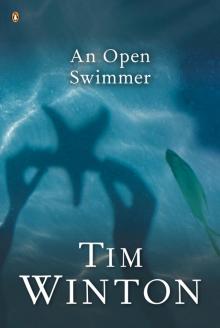 An Open Swimmer
An Open Swimmer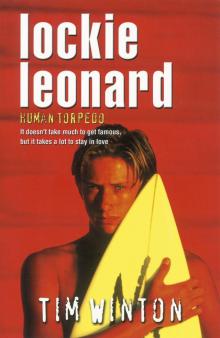 Human Torpedo
Human Torpedo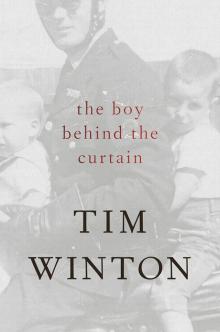 The Boy Behind the Curtain
The Boy Behind the Curtain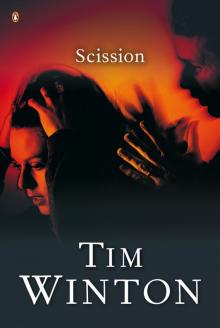 Scission
Scission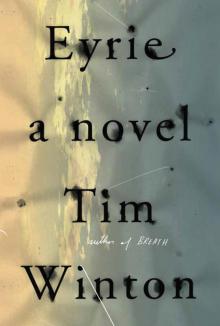 Eyrie
Eyrie Island Home
Island Home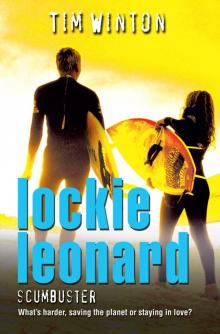 Scumbuster
Scumbuster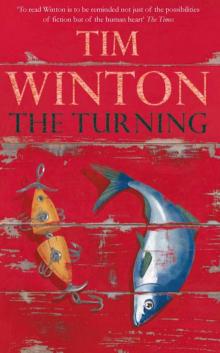 The Turning
The Turning Legend
Legend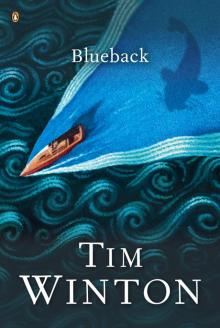 Blueback
Blueback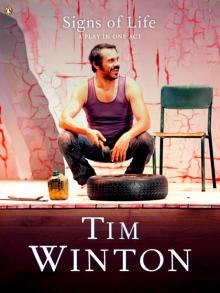 Signs of Life
Signs of Life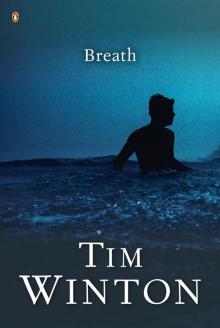 Breath
Breath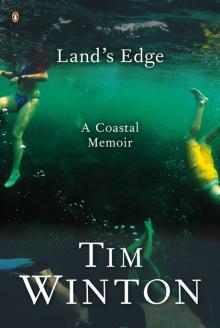 Land's Edge
Land's Edge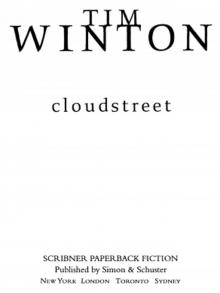 Cloudstreet
Cloudstreet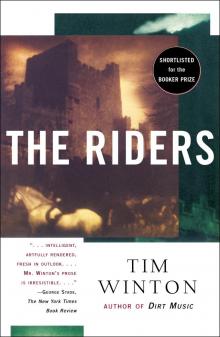 The Riders
The Riders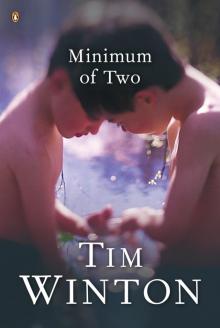 Minimum of Two
Minimum of Two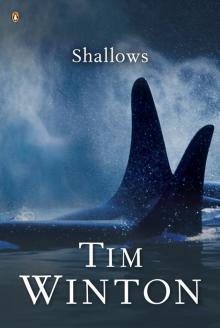 Shallows
Shallows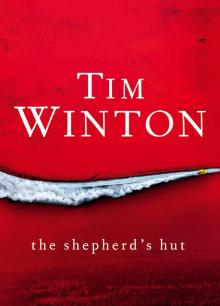 The Shepherd's Hut
The Shepherd's Hut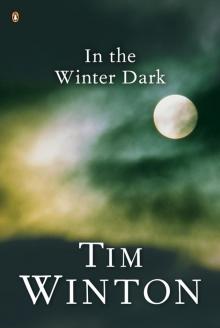 In the Winter Dark
In the Winter Dark